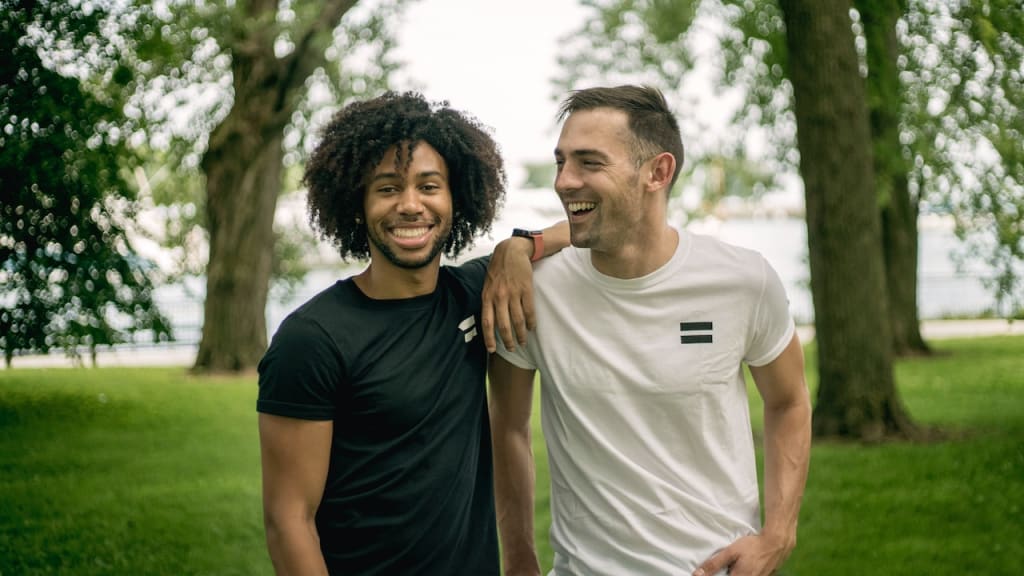How to be a great friend?
Being a great friend involves many different qualities and behaviors.

Being a great friend involves many different qualities and behaviors. Here are some tips on how to be a great friend:
Listen actively: A great friend is someone who listens actively and empathetically when you talk to them. They pay attention to what you're saying and show genuine interest in your life.
Indeed, undivided attention is a significant quality for being an extraordinary companion. For active listening, here are some suggestions:
Give it all your attention: At the point when your companion is talking, set aside any interruptions and spotlight what they are talking about. Avoid interrupting and maintain eye contact.
Show compassion: Attempt to figure out your companion's point of view and sentiments. Validate their experiences and demonstrate that you care about their feelings.
Clarify pressing issues: To encourage your friend to elaborate and share more details about their experiences, ask open-ended questions.
Paraphrase: Rehash back what your companion said as would be natural for you to ensure you comprehend them accurately and to show that you are tuning in.
Give your feedback: Give your friend feedback that demonstrates that you have heard what they have to say and that you care about what they have to say after they have finished speaking.
Active listening can help you better understand your friend's needs and concerns as well as strengthen your connection with them.
Be supportive: A great friend supports you through thick and thin. They are there for you when you need them, and they offer words of encouragement when you're feeling down.
Being supportive is a crucial quality of a great friend as well. Be supportive by following these guidelines:
Help out: When your friend requires assistance, be there for them. Make sure your friend knows that you are available to assist them, whether that assistance takes the form of listening, practical assistance, or just moral support.
Empower them: Offer words of encouragement and remind your friend of their strengths and positive qualities when they are feeling down.
Recognize their accomplishments: Celebrate with your friend whenever they accomplish something and show them that you are proud of them. Sending a congratulatory text or meeting for coffee to celebrate together can be as easy as this.
Be compassionate: Your friend should not be judged or criticized for their actions. Instead, try to comprehend their point of view and, when necessary, provide constructive criticism.
Regard their independence: While you ought to offer your help, it's vital to regard your companion's independence and permit them to settle on their own decisions.
By being strong, you can assist your companion with exploring troublesome times and feel engaged to seek after their objectives and dreams.
Be trustworthy: A great friend is someone you can trust with your secrets and confidences. They keep your personal information confidential and respect your boundaries.
Being dependable is a fundamental nature of an extraordinary companion. Be trustworthy by following these guidelines:
Be true to your word: Follow through on any promises you make to a friend. This shows that you are solid and dependable.
Keep secrets confidential: Keep it to yourself unless your friend permits you to reveal secret or confidential information.
Tell the truth: Even when it's hard, tell your friend the truth. This demonstrates that you value your friendship and helps establish trust.
When you are wrong, admit it: Accept full responsibility for your actions and offer sincere apologies if you make a mistake or disappoint a friend. This demonstrates that you value your friend's feelings and respect them.
Maintain boundaries: If your companion defines limits, for example, not having any desire to examine a specific subject, regard their desires and try not to push them to share more.
You can provide your friend with a secure environment in which they can express their thoughts and feelings if you are trustworthy. This may aid in the development of a deeper sense of connection and trust between you and your friend.
Be honest: A great friend is honest with you, even when it's hard. They are willing to give you constructive feedback and tell you when you're wrong.
Another important quality of a great friend is honesty. Be sincere by following these guidelines:
Be blunt: Be clear and direct with your friend when you have something to say. Avoid equivocating or using ambiguous language.
Offer helpful input: Offer kind and respectful feedback if your friend is doing something that you think is harmful or could be improved. Be specific and offer suggestions for ways to make things better.
Consider their point of view: Listen to what your friend has to say if they disagree with you or have a different point of view and try to comprehend their perspective.
Be sincere about how you feel: Be open with your friend about how you feel if they do something that makes you unhappy or hurts you. This can assist with staying away from mistaken assumptions and fabricating trust.
Do not cover up the truth: While it's critical to be caring and aware, don't gloss over reality or stay away from troublesome discussions. Even if it's difficult to hear, your friend deserves your honesty.
By telling the truth, you can help your companion develop and improve, and you can likewise fabricate a more grounded groundwork of trust and grasping in your fellowship.
Show up: A great friend shows up when you need them. They make time for you and are willing to lend a helping hand when you're in a tough spot.
Showing up is one more significant nature of an incredible companion. Here are a few ways to appear:
Be solid: Follow through on your plans if you make them with a friend. Don't leave your friend hanging or cancel at the last minute.
Be accessible: Even if you're super busy, make time for your friend. Show them that you esteem your fellowship and will focus on it.
Consider what they require: Be there for your friend when they need you and pay attention to what they need. This may entail giving up everything to assist them in an emergency or simply listening when they require someone to talk to.
Show sympathy: Make an effort to comprehend your friend's point of view and emotions and demonstrate your concern for their well-being.
Recognize their accomplishments: Be present for your friend's accomplishments as well as their difficulties. Praise their accomplishments and proposition support when they face difficulties.
By appearing for your companion, you can assist them with feeling esteemed and uphold, and you can reinforce your fellowship after some time.
Be a good communicator: A great friend is someone who communicates effectively. They express themselves clearly and respectfully, and they are willing to listen to your perspective.
An essential quality of a great friend is the ability to communicate effectively. Here are a few ways to be a decent communicator:
Be precise: While you're speaking with your companion, be clear and brief in your message. Abstain from utilizing obscure language or skirting the real issue.
Make statements with "I": Use "I" statements rather than "you" statements when expressing yourself. This can help you avoid sounding critical or accusatory.
Actively listen: At the point when your companion is talking, listen effectively and show that you are participating in the discussion. This implies offering them your full consideration and staying away from interruptions.
Keep away from judgment: Don't judge your friend or jump to conclusions when they talk about their feelings or thoughts. Instead, try to comprehend their point of view and offer assistance.
Respect others: Be respectful of your friend's feelings and boundaries when communicating with them. Abstain from interfering with them or excusing their viewpoints.
You can strengthen your friendship with your friend and avoid misunderstandings and disagreements by communicating effectively. A friendship that is more supportive and positive may result from this.
Celebrate successes: A great friend is happy for your successes and celebrates them with you. They don't envy your achievements but instead cheer you on and lift you up.
A crucial quality of a great friend is their capacity for success celebration. Here are some suggestions for recognizing achievements with a friend:
Genuinely excite yourself: When a friend accomplishes something significant, express genuine enthusiasm for their achievement. Celebrate with them and show them how much you care.
Recognize their efforts: Perceive the work and difficult work that your companion put into their prosperity. Let them know how much you value their commitment and dedication.
Congratulate them: Compliment your companion on their prosperity and let them in on that you are pleased with them. This can assist with helping their certainty and spur them to accomplish much more.
Be a part of their joy: Be a part of your friend's happiness. Celebrate with them and partake in the second together.
Avoid envy or jealousy: Try not to be envious of your friend's success. Instead, focus on how happy you are for them and how you can help them succeed in the future.
You can strengthen your friendship and demonstrate to them that you truly care about their happiness by celebrating successes with them.





Comments
There are no comments for this story
Be the first to respond and start the conversation.